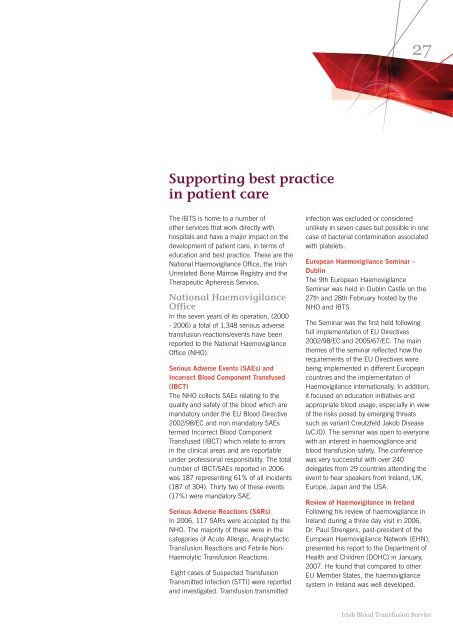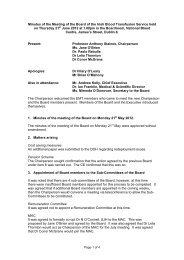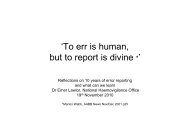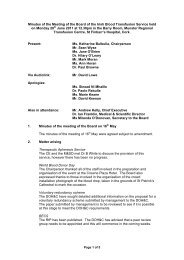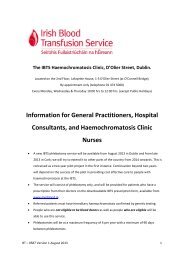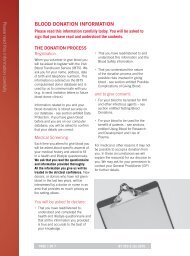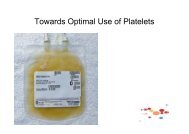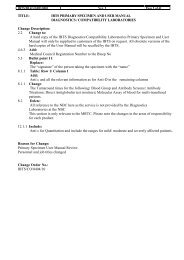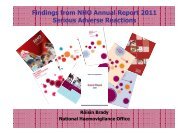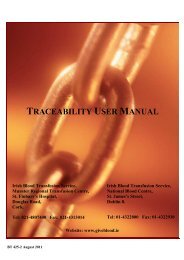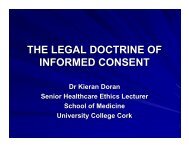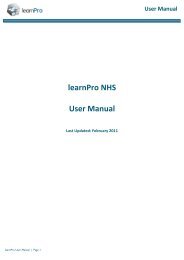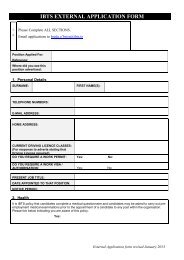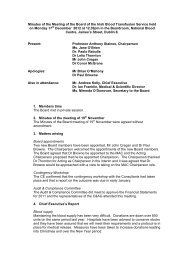IBTS Annual Report 2007.pdf - Irish Blood Transfusion Service
IBTS Annual Report 2007.pdf - Irish Blood Transfusion Service
IBTS Annual Report 2007.pdf - Irish Blood Transfusion Service
Create successful ePaper yourself
Turn your PDF publications into a flip-book with our unique Google optimized e-Paper software.
27<br />
Supporting best practice<br />
in patient care<br />
The <strong>IBTS</strong> is home to a number of<br />
other services that work directly with<br />
hospitals and have a major impact on the<br />
development of patient care, in terms of<br />
education and best practice. These are the<br />
National Haemovigilance Office, the <strong>Irish</strong><br />
Unrelated Bone Marrow Registry and the<br />
Therapeutic Apheresis <strong>Service</strong>.<br />
National Haemovigilance<br />
Office<br />
In the seven years of its operation, (2000<br />
- 2006) a total of 1,348 serious adverse<br />
transfusion reactions/events have been<br />
reported to the National Haemovigilance<br />
Office (NHO).<br />
Serious Adverse Events (SAEs) and<br />
Incorrect <strong>Blood</strong> Component Transfused<br />
(IBCT)<br />
The NHO collects SAEs relating to the<br />
quality and safety of the blood which are<br />
mandatory under the EU <strong>Blood</strong> Directive<br />
2002/98/EC and non mandatory SAEs<br />
termed Incorrect <strong>Blood</strong> Component<br />
Transfused (IBCT) which relate to errors<br />
in the clinical areas and are reportable<br />
under professional responsibility. The total<br />
number of IBCT/SAEs reported in 2006<br />
was 187 representing 61% of all incidents<br />
(187 of 304). Thirty two of these events<br />
(17%) were mandatory SAE.<br />
Serious Adverse Reactions (SARs)<br />
In 2006, 117 SARs were accepted by the<br />
NHO. The majority of these were in the<br />
categories of Acute Allergic, Anaphylactic<br />
<strong>Transfusion</strong> Reactions and Febrile Non-<br />
Haemolytic <strong>Transfusion</strong> Reactions.<br />
Eight cases of Suspected <strong>Transfusion</strong><br />
Transmitted Infection (STTI) were reported<br />
and investigated. <strong>Transfusion</strong> transmitted<br />
infection was excluded or considered<br />
unlikely in seven cases but possible in one<br />
case of bacterial contamination associated<br />
with platelets.<br />
European Haemovigilance Seminar –<br />
Dublin<br />
The 9th European Haemovigilance<br />
Seminar was held in Dublin Castle on the<br />
27th and 28th February hosted by the<br />
NHO and <strong>IBTS</strong>.<br />
The Seminar was the first held following<br />
full implementation of EU Directives<br />
2002/98/EC and 2005/67/EC. The main<br />
themes of the seminar reflected how the<br />
requirements of the EU Directives were<br />
being implemented in different European<br />
countries and the implementation of<br />
Haemovigilance internationally. In addition,<br />
it focused on education initiatives and<br />
appropriate blood usage, especially in view<br />
of the risks posed by emerging threats<br />
such as variant Creutzfeld Jakob Disease<br />
(vCJD). The seminar was open to everyone<br />
with an interest in haemovigilance and<br />
blood transfusion safety. The conference<br />
was very successful with over 240<br />
delegates from 29 countries attending the<br />
event to hear speakers from Ireland, UK,<br />
Europe, Japan and the USA.<br />
Review of Haemovigilance in Ireland<br />
Following his review of haemovigilance in<br />
Ireland during a three day visit in 2006,<br />
Dr. Paul Strengers, past-president of the<br />
European Haemovigilance Network (EHN),<br />
presented his report to the Department of<br />
Health and Children (DOHC) in January,<br />
2007. He found that compared to other<br />
EU Member States, the haemovigilance<br />
system in Ireland was well developed.<br />
<strong>Irish</strong> <strong>Blood</strong> <strong>Transfusion</strong> <strong>Service</strong>


